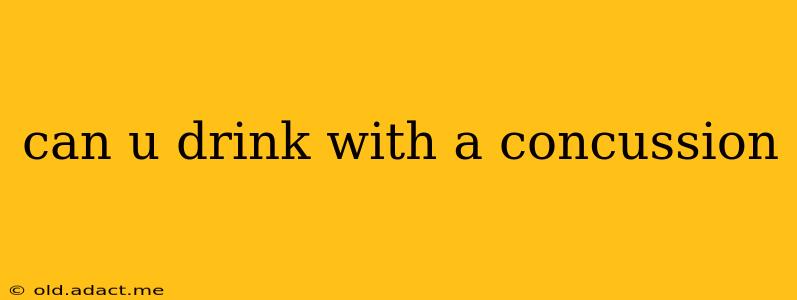Can You Drink Alcohol With a Concussion? A Definitive No.
The short answer is a resounding no. Drinking alcohol after a concussion is strongly discouraged and can significantly worsen the injury and recovery process. This isn't just a suggestion; it's crucial for your health and well-being. Let's delve into why.
Alcohol is a depressant, meaning it slows down brain function. A concussion, by its nature, is a traumatic brain injury (TBI) that disrupts normal brain activity. Combining these two factors creates a dangerous situation that can lead to serious complications.
What Happens When You Mix Alcohol and a Concussion?
Alcohol interferes with the brain's ability to heal after a concussion. The brain needs time and rest to repair itself following trauma. Alcohol inhibits this process, potentially prolonging recovery time and increasing the risk of long-term problems.
Here's a breakdown of the potential negative effects:
-
Increased Inflammation: Alcohol can increase inflammation in the brain, which is already heightened after a concussion. This extra inflammation can exacerbate symptoms and delay healing.
-
Delayed Recovery: Studies have shown that alcohol consumption can significantly prolong the recovery period from a concussion. Simple tasks that might normally take days to recover from can take weeks or even months if alcohol is consumed.
-
Exacerbated Symptoms: Alcohol can worsen existing concussion symptoms such as headaches, dizziness, nausea, vomiting, confusion, memory problems, and sleep disturbances. It can even trigger new symptoms.
-
Increased Risk of Complications: In severe cases, combining alcohol with a concussion can increase the risk of serious complications like post-concussion syndrome (PCS), which can lead to long-term cognitive, physical, and emotional problems.
-
Interaction with Medications: If you're taking prescribed medications for your concussion, alcohol can interact dangerously with these drugs, leading to unforeseen and potentially harmful side effects.
What are the Symptoms of a Concussion?
Recognizing the signs of a concussion is crucial for proper management and avoiding alcohol consumption. Symptoms can vary in severity and may not appear immediately. Some common symptoms include:
- Headache
- Dizziness
- Nausea and Vomiting
- Balance problems
- Blurred vision
- Sensitivity to light and noise
- Confusion
- Memory problems
- Difficulty concentrating
- Sleep disturbances
- Mood changes
How Long Should You Avoid Alcohol After a Concussion?
There's no single timeframe for when it's safe to resume alcohol consumption after a concussion. It's best to abstain from alcohol completely until you've received a medical clearance from your doctor. Your doctor will assess your recovery progress and advise you when it might be safe to reintroduce alcohol, if ever. This decision depends on the severity of your concussion and your individual response to treatment.
What Should You Do Instead of Drinking?
Focus on prioritizing your recovery. This involves plenty of rest, a healthy diet, and avoidance of strenuous activities. Staying hydrated is also critical. Talk to your doctor about any concerns you may have regarding your concussion recovery.
Can Alcohol Make a Concussion Worse?
Yes, absolutely. As discussed above, alcohol acts as a depressant, further hindering the brain's healing process already compromised by the concussion. The combination significantly increases the risk of prolonged recovery, intensified symptoms, and potential long-term complications.
What are the Long-Term Effects of Drinking Alcohol After a Concussion?
The long-term effects can be severe and include post-concussion syndrome (PCS), persistent cognitive difficulties, chronic headaches, and emotional problems.
In conclusion, consuming alcohol after a concussion is never a good idea. Prioritize your health and recovery by avoiding alcohol until you have received medical clearance from your healthcare provider. Your brain needs time to heal, and alcohol only hinders that process.
